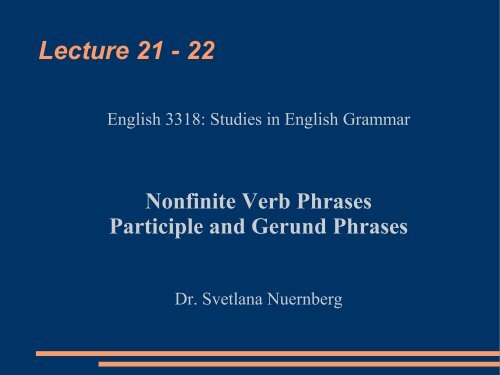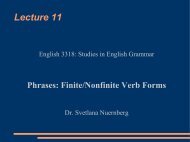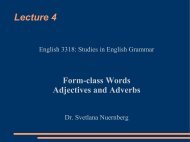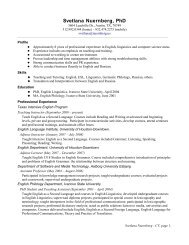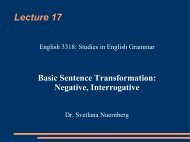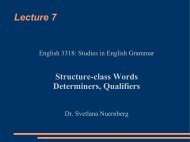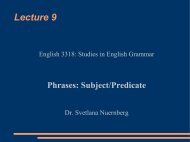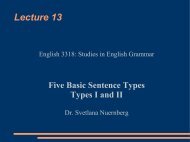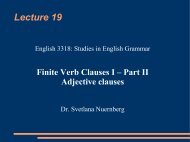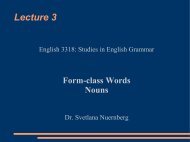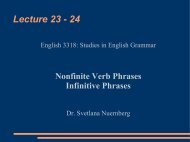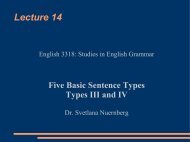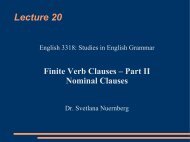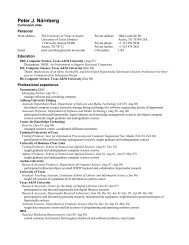Nonfinite Verb Phrases
Nonfinite Verb Phrases
Nonfinite Verb Phrases
Create successful ePaper yourself
Turn your PDF publications into a flip-book with our unique Google optimized e-Paper software.
Lecture 21 - 22<br />
English 3318: Studies in English Grammar<br />
<strong>Nonfinite</strong> <strong>Verb</strong> <strong>Phrases</strong><br />
Participle and Gerund <strong>Phrases</strong><br />
Dr. Svetlana Nuernberg
Objectives<br />
●<br />
●<br />
●<br />
●<br />
●<br />
●<br />
●<br />
●<br />
Identify Infinitive <strong>Phrases</strong><br />
Recognize infinitives with or without to and those<br />
preceded by for<br />
Distinguish between infinitives and prepositional<br />
phrases<br />
Recognize functions of infinitive phrases<br />
Distinguish between present-participle and gerund<br />
phrases<br />
Recognize past participle phrases<br />
Recognize functions of participle phrases<br />
Identify the nominal functions of gerund phrases
Present Participle <strong>Phrases</strong><br />
Present participle phrase with<br />
subordinating conjunction<br />
(elliptical clause)<br />
Present participle phrase without<br />
subordinating conjunction<br />
Present participle phrase with<br />
subject expressed<br />
While eating dinner, we discussed politics.<br />
Turning the corner, we felt a sudden<br />
gust of wind.<br />
Many students being sick that day,<br />
the professor postponed the film.
Functions of Present Participle<br />
Phase<br />
Adverbial Participial Phrase<br />
Sentence modifier Considering how late it is,<br />
we ought to go home.<br />
<strong>Verb</strong> modifier<br />
[After] hearing about the<br />
new assignments, the students<br />
groaned.<br />
Adjectival Participle Phrase<br />
Noun modifier<br />
Those people waiting for the bus<br />
look tired.
Diagramming Present Participle<br />
<strong>Phrases</strong> Turning the corner, we felt a sudden gust of wind.<br />
NP 1<br />
we felt gust<br />
MVP<br />
S V<br />
Turning<br />
corner<br />
VP<br />
the<br />
a sudden of<br />
NP 2<br />
ADVP<br />
MV CONJ<br />
S<br />
tr V<br />
wind<br />
Grammatical transformation<br />
alter this underlying structure by<br />
deleting the conjunction, the<br />
subject we, and TENSE + AUX<br />
from embedded sentence and<br />
moving present participle phrase<br />
to the beginning of the sentence.<br />
NP 1<br />
VP<br />
MVP<br />
NP 2<br />
MV tr<br />
We felt a sudden gust of wind as [we were turning the corner]
Different Between Present<br />
Participle and Adjectives<br />
●<br />
Some present participles have occurred as noun<br />
modifiers so often and for so long that they have<br />
become adjectives.<br />
– participle can modify a noun but will fail all other<br />
adjective tests<br />
– some can be function as participle or as adjective<br />
●<br />
●<br />
●<br />
●<br />
●<br />
●<br />
The static on that radio is annoying me. (participle)<br />
*The static on the radio is very annoying me.<br />
* The static on that radio is more annoying me than anything<br />
else.<br />
The static on that radio is annoying to me. (adjective)<br />
The static on that radio is very annoying to me.<br />
The static on that radio is more annoying to me than<br />
anything else.
Gerunds<br />
●<br />
When a verb with -ing inflection occupies a noun<br />
position it is called a gerund.<br />
– can have all the constituents associated with the sentence<br />
from which they are derived<br />
– can have a subject, take an object, be followed by a<br />
complement, or be modified by an adverb phrase<br />
●<br />
●<br />
He liked being editor of the school paper last year.<br />
– gerund phrase functions as a direct object of liked<br />
– he = the underlying subject of being<br />
– noun phrase editor of the school paper functions as subject complement of<br />
being<br />
– noun phrase last year functions as adverbial modifier<br />
His considering the play amusing surprised them.<br />
– gerund phrase functions as a subject of surprised<br />
– his – posessive pronoun (he) functions as subject of considering<br />
– the play = noun phrase functions as direct object of considering<br />
– amusing = present participle functions as object compliment of the play
Functions of Gerunds and Gerund<br />
<strong>Phrases</strong><br />
●<br />
Gerund and Gerund <strong>Phrases</strong> function like nouns<br />
and noun phrases<br />
– subjects<br />
– His immediately demanding your payment showed his<br />
inexperience.<br />
– objects (direct object)<br />
– Felicia's grandmother enjoys riding a ten-speed<br />
bicycle.<br />
– subject complements (predicate nominative)<br />
– Sherry's hobby was saving ordinary coins in a tin can.<br />
– objects of a preposition<br />
– Gerald can afford college by regularly working two<br />
jobs.
Summary<br />
Tests for Identifying Adverbial Participle <strong>Phrases</strong>.<br />
He tried to think carefully while answering their questions.<br />
1. Substitution of an adverb He tried to think carefully then.<br />
2. Wh-question using wh-adverb<br />
When did he try to think carefully?<br />
3. Movability<br />
While answering their questions, he tried<br />
to think carefully.<br />
Tests for Identifying Adjectival Participle <strong>Phrases</strong>.<br />
The static coming from that radio is annoying.<br />
1. Usually can be restated as a relative<br />
clause<br />
2. Modifies a noun that precedes it<br />
Tests for Identifying Gerunds<br />
She hates waiting around for a repairmen to show up.<br />
1. Substitute something or it for<br />
the gerund phrase<br />
2. Wh-question using what<br />
The static that is coming from that radio is<br />
annoying.<br />
The static coming from that radio is annoying.<br />
She hates something.<br />
What does she hate?
Difference Between Gerund and<br />
Present Participle<br />
●<br />
●<br />
●<br />
Compare:<br />
Betty having told us that you were coming, we<br />
weren't surprised.<br />
– contains a participle<br />
– adverbial present participle construction<br />
– its subject (Betty) is in uninflected form<br />
We appreciate Betty's having told us that you were<br />
coming.<br />
– contains a gerund<br />
– the entire phrase functions as a direct object of the<br />
verb appreciated<br />
– its subject (Betty's) is a possessive form of a noun
Differences Between Gerunds and<br />
Nouns<br />
●<br />
●<br />
Gerunds appear in the noun positions of sentences,<br />
but they can not take noun inflections<br />
– Eating too many green apples made her sick.<br />
– *Eatings too many green apples<br />
After functioning on the periphery of nounlike<br />
words, some gerunds became true nouns<br />
– The congressional meetings lasted several hours.<br />
●<br />
meetings comes after a determiner and is plural<br />
– We held the final meeting last week.<br />
●<br />
a true noun (has a determiner, modified by an adjective, can be<br />
plural)<br />
– They enjoy meeting each other for lunch every Saturday.<br />
●<br />
fails the noun tests (it is a gerund)
Past Participle <strong>Phrases</strong><br />
●<br />
Passive clauses containing past participles can also<br />
be reduced so that they become participle phrases.<br />
– When they were awakened by the unusual noise, the<br />
dog began to bark.<br />
●<br />
were awakened = TESNE [past]<br />
+ BE + {-en} + awaken<br />
– When awakened by unusual noise, the dog began to<br />
bark.<br />
– Restored by good rest, Cindy was eager to enter<br />
another marathon.<br />
●<br />
by way of clause reduction<br />
– After Cindy was restored by a good rest, Cindy was<br />
eager to enter another marathon.<br />
●<br />
by way of passive transformation<br />
– After a good rest [subject]<br />
restored [tr]<br />
Cindy [DO]<br />
+ Cindy was<br />
eager to enter another marathon.
Restrictive and Nonrestrictive<br />
Participle <strong>Phrases</strong><br />
●<br />
Because they are derived from relative clauses,<br />
participle phrases functioning adjectivally can either<br />
be restrictive or nonrestrictive.<br />
– The lone Romulan warship, crippled by photon<br />
torpedoes, drifted slowly toward the asteroid.<br />
●<br />
●<br />
●<br />
●<br />
●<br />
nonrestrictive<br />
only one Romulan warship is reffered to<br />
doesn't specify or restrict which warship is being referred to<br />
provides additional information<br />
set off with commas (like non restrictive relative clause)<br />
– The lone Romulan warship crippled by photon torpedoes<br />
drifted slowly toward its undamaged sister ship.
Functions of Past Participle<br />
1. Postnoun modifier (adjectival) The car parked behind the movie theater<br />
belongs to an asher.<br />
2. Prenoun modifier (adjectival) Irrigated fields produce most of our lettuce.<br />
3. Adjectival object complement The crowd saw them trounced by their<br />
opponents.<br />
4. Pre – or postclause modifier When inflated, the balloon measured six feet<br />
(adverbial)<br />
in diameter.<br />
5. Pre – or postclause modifier Refused a place on the ticket, Hubert<br />
(ambiguous: adverbial or adjectival) decided to run as an Independent.
Differences Between Past<br />
Participles and Adjectives<br />
●<br />
Many past participles have been used as noun<br />
modifiers for a long time, so they have become<br />
adjectives<br />
– Disturbed by rumors, the committee decided to<br />
investigate the mail order company. (adjective)<br />
●<br />
can be compared – very disturbed, more disturbed than usual<br />
– The painting offered to the museum were auctioned off<br />
for 30 million dollars. (participle)<br />
– Informed of her test results, Patrice decided to take the<br />
Sats again. (participle)<br />
– Informed on many subjects, Meredith is in demand as a<br />
speaker. (peripheral adjective)
Nominative Absolutes<br />
●<br />
●<br />
Are related to the nonfinite verb phrases.<br />
– consist of a subject noun phrase followed by some part of<br />
the predicate<br />
●<br />
●<br />
Examples<br />
either a participle form of the main verb or a compliment or<br />
modifier of the main verb<br />
TENSE and forms of the verb be (aux, or main) in the following<br />
examples have been removed to create absolute<br />
– The year's work completed, Santa lay down for a long rest.<br />
●<br />
The year's work was completed (Type V passive completed = past<br />
participle<br />
– His voice quavering, Charlie called, “Is anyone there?”<br />
●<br />
His voice was quavering (Type I quavering = present participle)<br />
– Help neaby, the team climed confidently to the top.<br />
●<br />
help was nearby (Type II nearby = adverb)


